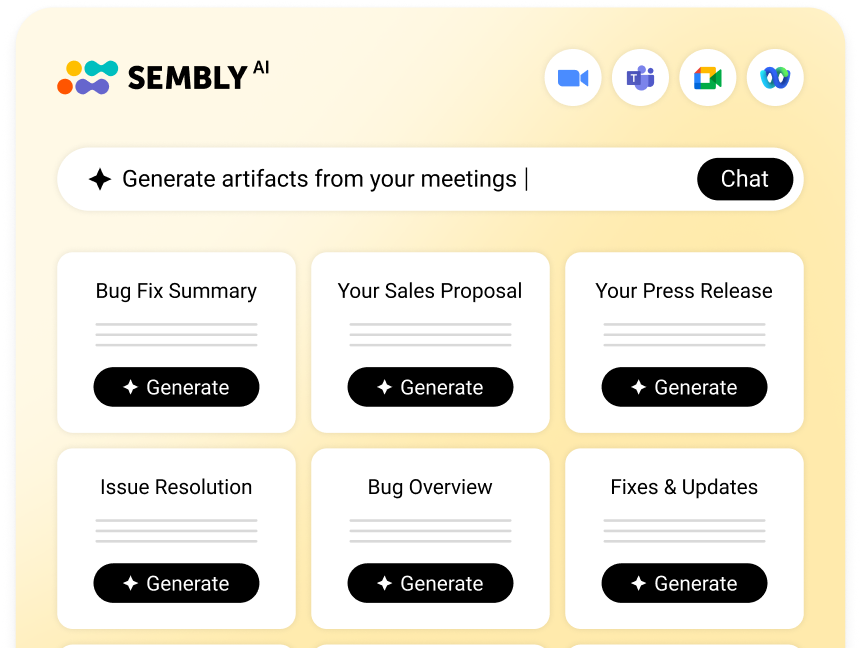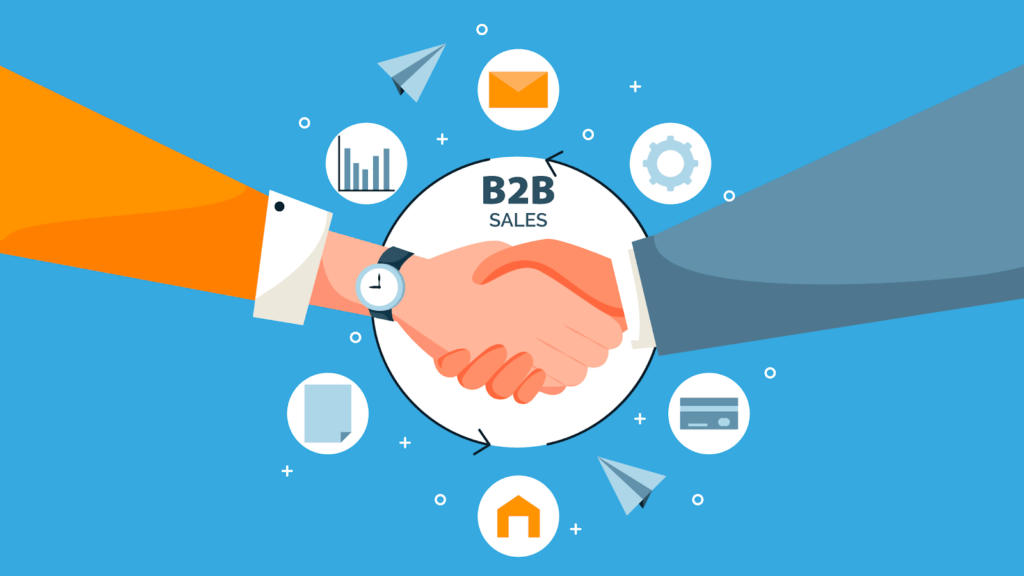Table of Contents
ToggleArtificial intelligence: two words that completely changed the world recently. AI has already transformed many areas of business, from customer support to manufacturing. However, what about the fields traditionally reliant on human touch and intuition? While chatbots handle millions of simple customer requests in eCommerce, the world of B2B sales presents a different story. In this domain, where deals shape entire industries and relationships span decades, the human touch seems irreplaceable. However, that’s only at first glance. Can AI really grasp the complexity of enterprise sales, where success depends on understanding unspoken business needs and building trust?
The answer may surprise even skeptics. AI in B2B sales provides value beyond just automating certain routine tasks. When AI joins forces with sales teams, magic happens. Top performers close deals they never thought possible, uncover opportunities their competitors miss and transform traditional sales into a precise science of success.
Well, we don’t say that the old ways of selling to businesses have faded into history, or that sales processes no longer require human involvement. However, with an understanding of how to use AI for B2B sales, companies definitely receive a powerful competitive edge. AI-powered tools help sales teams spot patterns in customer behavior, predict market trends, make decisions backed by solid data, and many more. In our opinion, the future of B2B sales lies in this perfect blend of human expertise and advanced AI capabilities. So, let’s explore how this balance can be achieved and what strategies bring the best results together.
Introduction: The Role of AI in B2B Sales
Of course, AI has revolutionized many business areas around sales, ranging from automated content generation in marketing to AI in project management and customer service automation in support departments. However, all of these represent indirect impact. Yet the profound direct impact emerges in the B2B sales process itself, where AI transforms how companies identify, pursue, and close deals.
Using B2B sales AI now impacts several key areas, such as lead scoring, customer insights, predictive analytics, deal forecasting, and more. In 2025, AI analyzes vast amounts of company data, market signals, and interaction patterns to spot the best opportunities. Sales teams use AI to understand which prospects will likely buy, when to reach out, and how to approach each account. The technology tracks digital footprints from emails, calls, and meetings, revealing buying signals the human eye might miss.
Deal management becomes precise with AI tracking each step of the sales process. The technology helps teams set the right prices, recommend relevant solutions, and time their follow-ups perfectly. It analyzes communication patterns to flag deals at risk and predict outcomes based on actual customer behavior rather than intuition. This combination of insight and prediction helps sales leaders focus their resources where they matter most.
Redefining Traditional B2B Sales
Traditional B2B sales required sales reps to handle every aspect of the process – from identifying prospects to negotiating deals. Today, everything that involves data analysis moves to AI’s domain. Artificial intelligence processes market information, tracks customer behavior, and predicts sales outcomes – tasks that once consumed hours of sales reps’ time. This shift lets sales professionals focus on what machines can’t replicate: building genuine relationships and solving complex business challenges.
The new sales approach draws a clear line: data goes to AI, strategy stays with humans. While AI crunches numbers and spots patterns in market data, sales professionals apply their judgment to unique situations. They interpret AI’s insights, participate in complex negotiations, and build the trust that drives major B2B deals. This partnership creates a powerful mix: AI’s analytical precision combined with human creativity and emotional intelligence. Sales teams using this approach close more deals while focusing more on what truly matters—understanding and solving customer problems.
Core AI-Driven Tactics for B2B Sales Success

Now, let’s move to the practical part of our guide. Let’s take a closer look at the areas where using AI for B2B sales shows the best results. Each tactic, or rather area of practical implementation, mentioned below represents a tested approach that leading companies already used to enhance their sales performance:
Customer Insights and Predictive Analytics
When we talk about AI’s impact on B2B sales data, we see a dramatic shift. Before AI, sales teams only tracked basic numbers – deals closed, revenue earned, and basic client details. Now, AI builds a complete picture of each potential account. It analyzes every customer interaction – from website visits to social media activity and meeting records. Sales conversations become particularly valuable. Modern AI tools, such as Semblian 2.0, analyzes meeting transcripts to spot buying signals, understand concerns, identify winning strategies, track customer sentiment, and find the talking points that lead to successful deals.
Predictive analytics in B2B sales goes beyond simple forecasting. AI studies how companies grow, change their technology stack, hire new employees, or expand to new markets – all signals that might indicate buying potential. The technology combines this data with industry trends and past deal patterns to predict which enterprises are likely to need specific solutions. This helps enterprise sales teams prioritize accounts that show real buying intent and time their outreach for maximum impact.
Enhanced Lead Scoring With AI
Another point where AI can help with potential leads is lead scoring. Here, AI transforms the lead-scoring process from guesswork to precision. The technology analyzes company data, digital footprints, and interaction history to identify hot leads with remarkable accuracy. It spots buying signals across emails, website visits, and social media engagement to rank prospects by their likelihood to purchase. This helps sales teams understand potential leads better, focusing on high-quality leads while spending less time on prospects who aren’t ready to buy.
Automated Outreach and Communication
Anyone with a LinkedIn account will tell you that outreach has changed significantly in recent times. Generative AI tools now create personalized sales scripts and cold emails at scale. Tools for automated lead generation study past successful messages to craft content that matches each prospect’s industry and role. AI-powered lead generation helps sales teams pick the perfect time to reach out and suggests topics that grab decision-makers’ attention.
The human touch still matters, of course, but AI makes it more effective. The technology tracks response rates and engagement patterns across different message types. It learns which approaches work best and helps sales reps adjust their strategy. AI suggests the best time for follow-ups and helps tailor each message to the prospect’s past interactions. This balance of automation and personalization turns cold outreach emails into conversations that lead to deals.
Personalization at Scale
AI transforms personalization across the entire B2B sales cycle. Beyond crafting tailored outreach messages, it personalizes every customer touchpoint. AI sales tools analyze a company’s past purchases, support tickets, and product usage to suggest custom solutions. It adapts sales materials, product demos, pricing models, meeting agendas, presentation content, and solution packages based on each account’s size, industry challenges, growth stage, and technology preferences. This level of personalization enables sales teams to build stronger customer relationships while reaching more prospects.
AI-Driven Market Analysis and Competitor Tracking
However, AI analysis is not only about tracking potential customers. AI can also monitor market changes and competitor activity across all available digital channels. It tracks pricing shifts, product launches, and market expansions in real time. The technology analyzes competitor content, social media presence, and customer feedback to spot trends and opportunities. This helps B2B sales teams adjust their strategies quickly and position their offerings more effectively against competitors.
Optimizing Sales Strategies with AI Insights
However, nowadays, AI is also used by B2B sales teams to optimize the entire sales approach rather than its specific elements. Modern technology offers valuable insights by analyzing successful deals, market trends, and customer behavior patterns that can be used to build more efficient sales strategies. By creating precise ideal customer profiles, improving sales forecasting accuracy, and suggesting the best ways to approach different account types, AIs offer sales managers valuable insights regarding how they should approach their strategies.
However, it’s not only about forecasting and long-term analysis. AI sales assistants track deal progress in real-time to predict outcomes and suggest strategy adjustments. This helps sales reps pick promising targets, set achievable quotas, focus on winnable deals, and optimize territory coverage. The result: better market penetration, improved win rates, shorter sales cycles, and eventually higher revenue per account.
Enhancing Customer Retention Using AI
In customer retention, AI for B2B sales offers early warning systems and proactive engagement. Technology spots signs of customer dissatisfaction by analyzing usage patterns, support tickets, and communication history. It predicts which accounts might leave and suggests targeted actions to keep them engaged. Sales representatives receive alerts about accounts at risk, along with recommendations for retention strategies that have worked in similar cases. This approach helps companies maintain higher conversion rates and turn existing customers into long-term partners.
Improving Sales Funnels With AI
Tracking how potential customers move from awareness to purchase is key to building a successful sales funnel. And AIs can help with it. As mentioned above, AIs excel at analyzing customer behavior at each step. In the case of sales funnels, it helps identify bottlenecks and drop-off points. The marketing team uses these insights to adjust content and outreach timing, while sales reps get alerts about prospects ready to buy. AI also helps with personalizing the customer experience by adapting website content, email sequences, and sales materials tailored to each company’s engagement history. This targeted approach leads to smoother transitions between funnel stages and higher conversion rates.
AI in B2B Sales Forecasting
The analysis doesn’t make sense without consequent forecasting. AI transforms this B2B sales forecasting from guesswork into science. Modern AI tools analyze deal histories, market trends, and customer signals to provide data-driven insights about future sales. This helps sales teams focus their sales efforts on the most promising opportunities while predicting revenue with better accuracy. Overall, sales leaders can now plan resources, set realistic targets, and adjust strategies based on clear data-based patterns rather than intuition.
Semblian (Sembly.AI): AI-Assistant Enhancing B2B Sales Performance

Let us present one of the AI tools mentioned in today’s article: Semblian. This AI assistant transforms how sales teams handle daily tasks and strategic planning. Semblian takes over key administrative work – from generating sales activity plans to creating detailed client proposals. It analyzes meeting transcripts, tracks deal progress, and turns conversations into actionable insights that inform sales strategy. This tool helps sales teams spend less time on paperwork and more time fostering customer relationships.
Semblian adapts to different sales roles and needs. For sales managers, it creates comprehensive activity plans and pipeline reports. Account executives, in turn, use it to streamline contract negotiations and simplify client onboarding. Semblian integrates smoothly with existing sales workflows to generate custom documents, track performance metrics, and provide data-driven recommendations. This adaptable tool is a valuable asset for modern B2B sales teams looking to improve their efficiency.
Challenges and Considerations in Implementing AI in B2B Sales
Artificial intelligence brings powerful capabilities to businesses. Yet, sales leaders must address key AI-associated challenges to maximize its value in their sales processes.
| Challenges | How to handle them |
| Lead quality assessment | Create clear scoring criteria. Past conversation data may be valuable information to train AI to rank leads. |
| CRM data accuracy | Set data entry standards. Clean existing records before AI implementation. |
| Integration with sales stack | Map current tools and workflows. Choose AI solutions with well-designed key integrations. |
| Confusion with customer communication | Set rules for AI vs. human interaction. Keep sensitive discussions personal. |
| Sales cycle analysis | Track key conversion points. Identify where AI can speed up decisions |
| Territory planning | Use AI to map customer clusters. Balance territories based on opportunity value. |
| Competitive intelligence | Monitor market signals with AI tools. Share insights through sales enablement. |
| Pipeline management | Set clear stage definitions. Use AI to flag at-risk deals. |
To Wrap Up
The integration of AI into B2B sales represents more than a technological upgrade—it marks a fundamental shift in how businesses approach enterprise deals. While AI handles data analysis, pattern recognition, and predictive modeling, sales professionals can concentrate on relationship-building and solving complex problems. This partnership between human expertise and machine intelligence creates a more effective sales process that benefits both sellers and buyers.
The future of B2B sales lies in finding the right balance between AI capabilities and human touch. Companies that successfully blend AI-driven insights with personal relationships gain a significant competitive advantage. As AI tools continue to evolve, sales teams that adapt to this hybrid approach will be better positioned to identify opportunities, maintain long-term customer relationships, and eventually close deals.
FAQs
What is the main role of the AI in B2B sales?
AI analyzes customer data, predicts buying behavior, and automates routine and repetitive tasks, so sales teams may focus on other areas of their work that need more human intuition, such as strategic planning and building complex partnerships and relationships.
Can AI replace sales representatives?
No. AI supports sales teams by handling certain areas of their daily tasks, such as data analysis, but the human touch is still the only way to manage relationships and complex negotiations.
Can small businesses use AI in sales?
Yes, small businesses can use AI to enhance sales processes. There is a wide list of affordable, ready-made solutions like email automation and lead scoring tools. Entry-level AI platforms start at $200-500 monthly, making them accessible for smaller sales teams.
How does AI-powered B2B sales engagement transform the sales process?
AI-powered B2B sales engagement automates prospect outreach while personalizing each interaction based on company data and behavior patterns. The technology tracks buyer signals across channels, times communications for maximum impact, and helps sales teams focus on high-value conversations.
How does B2B sales AI transform deal forecasting?
AI sales B2B tools analyze historical deals, market signals, and buyer behavior to predict win rates and revenue with 85-90% accuracy. This shifts forecasting from intuition to data-driven decisions.
- Multi-meeting chats
- AI Insights
- AI Artifacts


